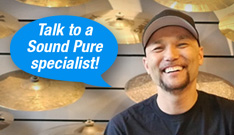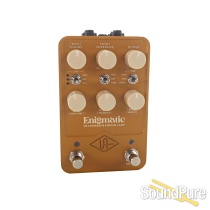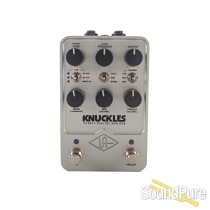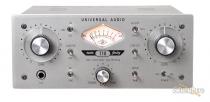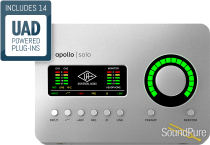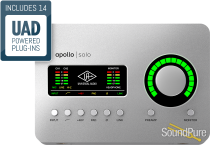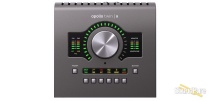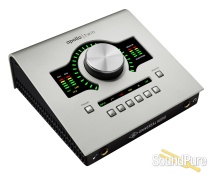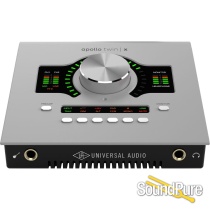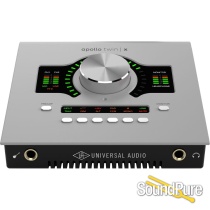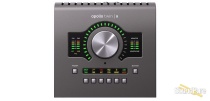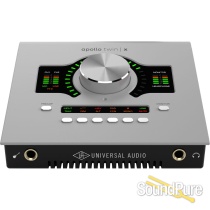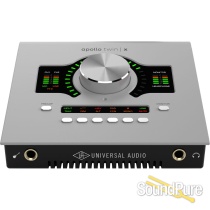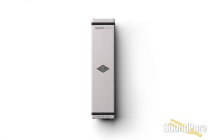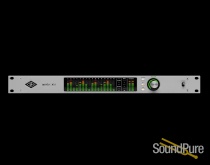
Universal Audio
Universal Audio Inc. was re-founded in 1999 by Bill's sons, James Putnam and Bill Putnam Jr., with two main goals: to faithfully reproduce classic analog recording equipment in the tradition of their father, and to design new digital recording tools with the sound and spirit of vintage analog technology. However, as Bill Jr. recounts, the genesis of "UA, part 2" is actually a bit more serendipitous. Having grown up in the music industry, Bill Jr. and James ("Jim") Putnam naturally assumed that the music business is where they'd eventually end up. Jim, a touring musician and recording engineer, and their older brother Scott, a studio designer in Southern California, were the first to follow i... (view more)
Universal Audio - Universal Audio Inc. was re-founded in 1999 by Bill's sons, James Putnam and Bill Putnam Jr., with two main goals: to faithfully reproduce classic analog recording equipment in the tradition of their father, and to design new digital recording tools with the sound and spirit of vintage analog technology. However, as Bill Jr. recounts, the genesis of "UA, part 2" is actually a bit more serendipitous. Having grown up in the music industry, Bill Jr. and James ("Jim") Putnam naturally assumed that the music business is where they'd eventually end up. Jim, a touring musician and recording engineer, and their older brother Scott, a studio designer in Southern California, were the first to follow in Bill Sr.'s path. However, Bill Jr. took a more circuitous direction, working for a number of engineering companies before undertaking a doctorate in Electrical Engineering at Stanford University. It was at Stanford that Bill Jr. became closely involved in the Center for Computer Research in Music and Acoustics (CCRMA), specializing in signal processing. It was also at Stanford that Bill Jr. began to assemble a team of the best and brightest minds in the field — who continue to steer many of Universal Audio's engineering efforts to this day. However, the precise event that led Bill and Jim to start (or "reinvent") Universal Audio in 1999 was unexpected. As Bill Jr. tells it, when Bill Sr. passed away in 1989, he and Jim were faced with the Herculean task of cleaning out their dad's workshop and storage areas. While going through Bill Sr.'s old test equipment, boxes of parts, bits and pieces of consoles, and half-cannibalized 1176 compressors, Jim came across their father’s old design notebook. The two spent the evening poring over his notes, realizing that this was the map to every technical problem their father had ever solved. It was at that moment that they decided to bring back Universal Audio and its classic products. Fast forward a decade. Now with nearly 80 employees and legions of new customers worldwide, UA is headquartered near the Silicon Valley, in Scotts Valley, California — where our classic analog gear is still hand-built, one unit at a time. The lengths we go to deliver the exact sound and performance of classic analog audio gear is unparalleled; in fact, the goal is for UA's modern units to perform identically to well-maintained units built decades ago. Of course, analog is only half the story. At Universal Audio, we employ the world's brightest DSP engineers and digital modeling authorities to develop our award-winning UAD Powered Plug-Ins platform, featuring the most authentic analog emulation plug-ins in the industry. Our DSP gurus work with the original hardware manufacturers — using their exact schematics, golden units, and experienced ears — to give UAD plug-ins warmth and harmonics in all the right places, just like analog. (view less)
By Category
- Multi-Channel (40)
- Small (2 Channel) (28)
- Plug-In Bundles (17)
- Reverb (10)
- Compressor/Limiter (9)
- PCI/Interface Card (9)
- Processors/Studio (6)
- Solid State (6)
- Channel Strips (5)
- Dynamic Mics (5)
- Multi-Chan Pres (5)
- Vacuum Tube (4)
- A/D and D/A (4)
- Attenuators/Etc. (4)
- Single-channel Pre (3)
- Other (2)
- OD / Distortion (2)
- Compression/EQ (2)
- Delay/Echo (2)
- Small Diaphragm (1)






